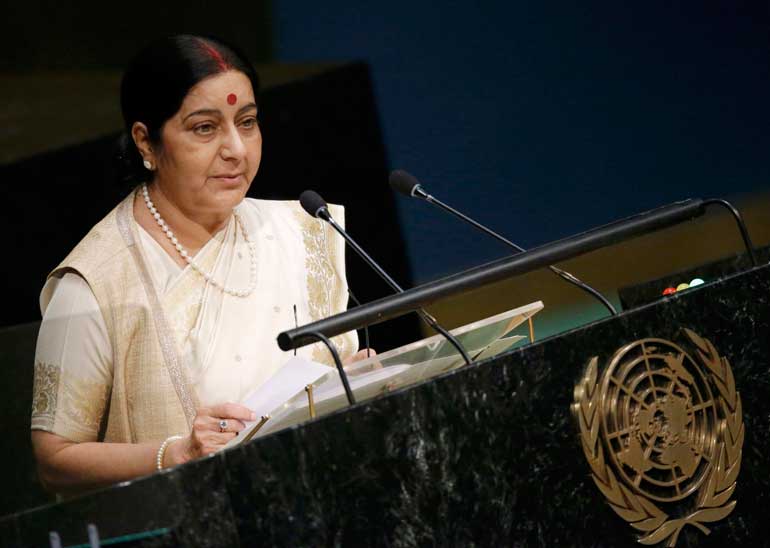Tuesday Feb 24, 2026
Tuesday Feb 24, 2026
Saturday, 3 October 2015 00:00 - - {{hitsCtrl.values.hits}}
 India’s Minister of External Affairs Sushma Swaraj addresses attendees during the 70th session of the United Nations General Assembly at the U.N. Headquarters in New York, October 1, 2015. REUTERS
India’s Minister of External Affairs Sushma Swaraj addresses attendees during the 70th session of the United Nations General Assembly at the U.N. Headquarters in New York, October 1, 2015. REUTERS
India on Thursday rejected a four-point peace plan for Kashmir proposed by Pakistan but said talks among officials of both countries on terrorism that collapsed in August should be revived.
Pakistani Prime Minister Nawaz Sharif announced his proposal at the annual United Nations General Assembly on Wednesday, saying the two nuclear-armed countries should formalise a cease-fire in Kashmir and take steps to demilitarise the divided region.
India issued a swift rebuttal, accusing Pakistan of claiming to be the primary victim of terrorism while, ‘in truth, it is actually a victim of its own policy of breeding and sponsoring terrorists’.
On Thursday, Indian Foreign Minister Sushma Swaraj told the General Assembly that India remained open to dialogue, ‘but talks and terror cannot go together’.
“We don’t need four points, we need just one: Give up terrorism and let us sit down and talk,” she said.
Swaraj said the talks between national security advisers on all issues related to terrorism should be held, as well as an early meeting of senior military officials to address the situation on the border.
“If the response is serious and credible, India is prepared to address all outstanding issues through a bilateral dialogue,” she said.
Planned talks between national security advisers from India and Pakistan were cancelled in August hours before they were due to start, dashing hopes the two might tackle the violence that many fear could one day spark a nuclear showdown.
In the talks, India had wanted only to discuss terrorism-related issues. Pakistan sought a wider agenda, including the status of Kashmir.
India and Pakistan have fought three wars since becoming independent countries in 1947, two of them over the Himalayan region of Kashmir, which both claim in full but rule in part.
Sharif, elected in 2013, promised to improve relations with India. But since then domestic troubles have forced him to cede more control over foreign and security policy to Pakistan’s more hawkish military.
Indian Prime Minister Narendra Modi has taken a hard line with Pakistan, insisting he is unwilling to discuss other issues unless Pakistan admits its role in terror attacks in India.
India’s Ministry of External Affairs made it clear that Sharif’s proposal was a non-starter. “To de-militarise Kashmir is not the answer,” ministry spokesman Vikas Swarup said in a tweet. “To de-terrorise Pakistan is.”